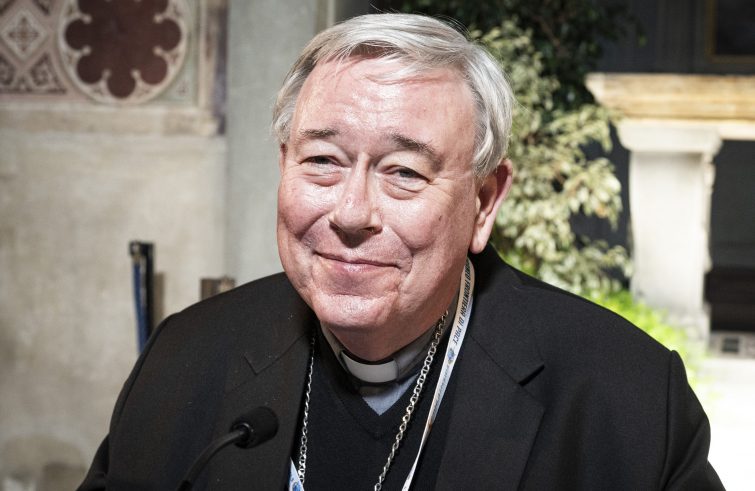
A ceasefire in Ukraine: it is the request of the Christian Churches in Europe. “We must always have hope and do all we can so that the impossible becomes possible”, said Card. Jean-Paul Hollerich, President of COMECE, speaking to SIR after the papal audience of the Presidency of the Commission of the Bishops’ Conferences of the European Union that took place yesterday, Monday, December 12. The members of the COMECE presidency have reached the end of their five-year mandate. “I will not be in office for a second term,” the Cardinal said, announcing that he will be leaving his position at COMECE in March to dedicate himself to the task entrusted to him by Pope Francis as General Rapporteur of the Synod on Synodality. “The work of the Synod is very demanding,” he explains. “And it’s hard to successfully carry out these two tasks at once.” The audience with Pope Francis was thus also “an opportunity for thanking the Holy Father for everything he has done for Europe and the European Union in this period. We also spoke at length about Ukraine.
It is evident that the Pope is very saddened by this war, people are dying, suffering every day.”
What hurts Pope Francis the most?
The people who are suffering. The freezing temperatures, the lack of food. War is waging and soldiers and civilians are dying every day. This weighs heavily on the Holy Father. We must do everything within our reach to bring about a just peace and we must also do all we can to bring about reconciliation, for there can be no peace without reconciliation.
Do you think that despite everything the Pope still believes in a viable path to peace?
I do, indeed. And I believe it myself as well. We must always have hope and do everything we can to make the impossible become possible.
Which concrete peace-building steps could be taken?
There are a number of initiatives carried out together with the CEC, the ecumenical body representing the Orthodox, Protestant and Anglican Churches in Europe. We are planning an initiative to request, with a joint appeal, for a ceasefire that may bring peace.
Which Europe is emerging from these talks with Pope Francis?
A more just Europe, one that is capable of assuming its responsibility for ecology, a Europe that is a driver of peace in the world and a Europe that should not forget Christianity. A pluralist Europe, that is not only Christian. All religions must work for peace and justice in Europe.
Yet in this Europe, people continue to die, especially along the Mediterranean Sea route. How is this possible?
I receive constant reports from the Mediterranean region and from the Libyan migrant centres that are like concentration camps, marked by violence and wounds inflicted on human dignity. Last Thursday I had a meeting with the Austrian Minister for European Affairs in Vienna, during which we discussed the refugee policy. Austria has a strict policy. Now only ”legal migrants” are referred to, and there is no more mention of refugees and displaced persons. This means no longer believing in the crises that are happening in world countries. These people arrive here because they have were left with virtually nothing in their home countries. A large number of refugees have fled also as a result of climate change. And this is only the beginning. Therefore, we must be welcoming and at the same time address the causes of migration.
Europe must not forget the suffering humanity, and it must not forget that Christian humanism forms part of its DNA. If we define ourselves as Christians but the commitment to our brother and sister in need is missing, we cannot call ourselves Christians.
The European Parliament was shaken by the Qatar corruption scandal. What were your thoughts when you read the news reports?
These things hurt. Corruption is always a great injustice. And the fact that corruption occurred at the European Parliament makes it all the more painful. Then again, the lady failed to elude justice, and that is good news. It means that this corruption mechanism was discovered thanks to Belgium’s efficient judicial system. It is impossible to bring corruption into the European Parliament without anyone noticing. Therefore, this is good news. It is obvious that especially people living in poverty, those who are afraid of the future because of rising prices, are upset when they see this high level of corruption. Such news makes people angry, and people are right to be angry. However, it should be pointed out that law enforcement operated successfully and corruption was uncovered.
Five years as President of the Commission of the Bishops’ Conferences of the European Union. Can you give us your assessment?
It is a positive assessment. Our secretariat does an extraordinary job with competent experts and an ongoing dialogue with institutional bodies. Collegiality among the bishops has likewise been a very beautiful experience. It can be said that COMECE is well-known today, and we enjoy the respect of European institutions. I would also like to mention the work carried out together with CEC. All of these aspects have made it possible for us to have some leverage over the years.
What kind of Europe would you like to see?
I would like Europe to be a place where religion is not perceived as a private matter but rather a place where all religions have a public voice, participate in democratic debates and can be listened to as moral authorities because their voice is necessary for Europe.
At times, ours may be a critical voice, for example with regard to migration policies. But it’s important to have that voice.









